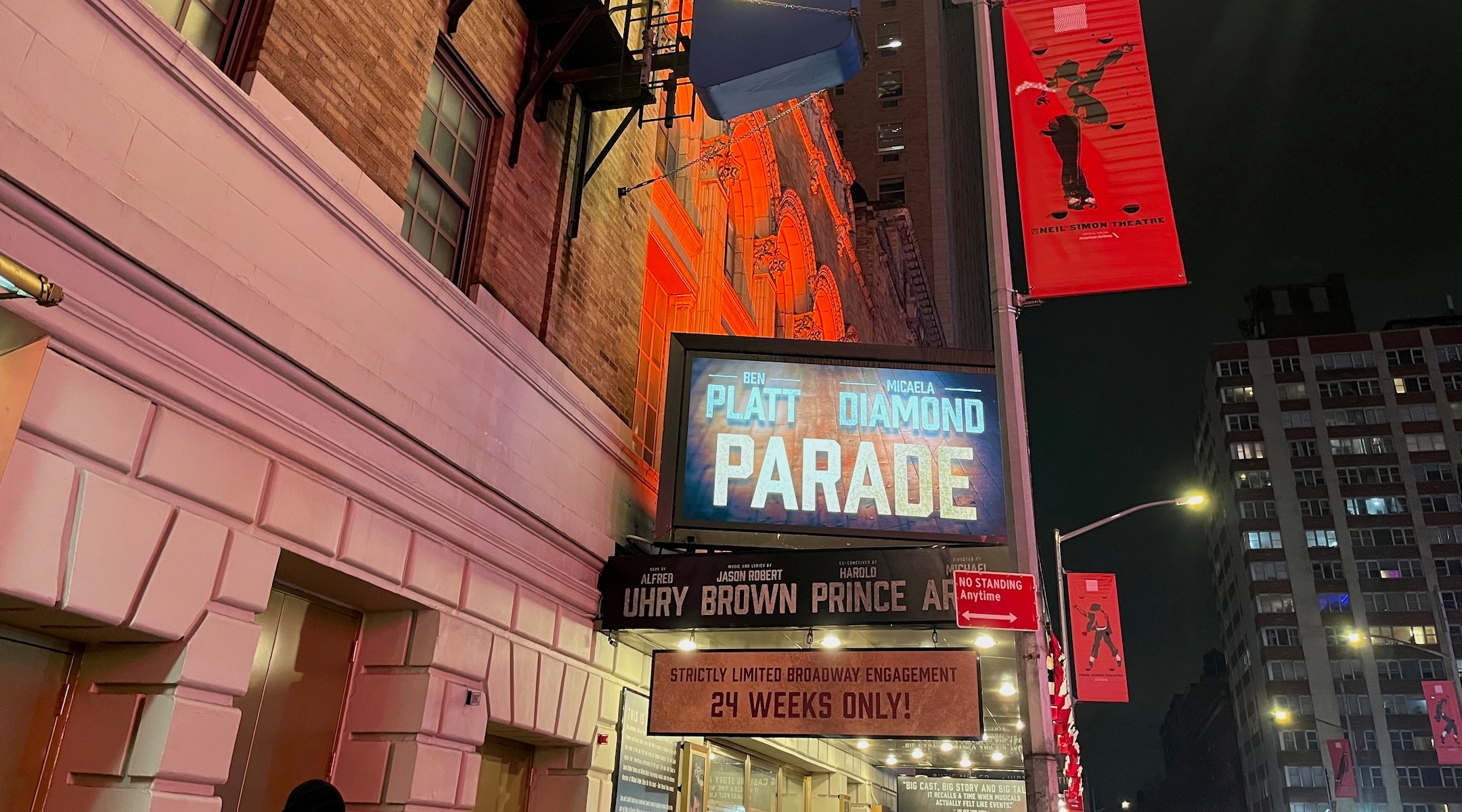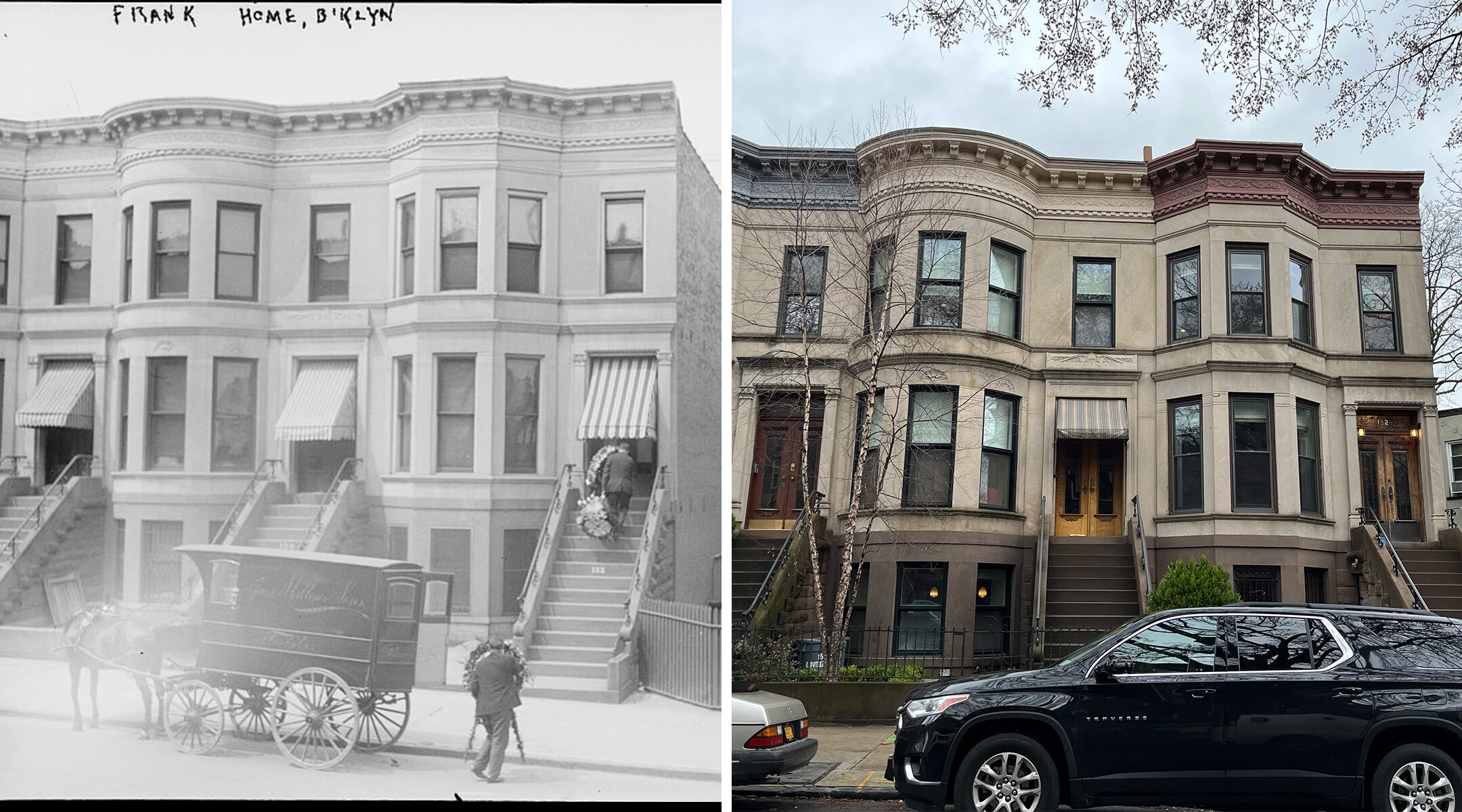(New York Jewish Week) — The singer and actor Ben Platt spends most of his time these days on West 45th Street in Manhattan, where he performs eight times a week as Leo Frank, a Jewish man who was lynched by a Georgia mob in 1915.
But he took a detour on a recent afternoon to Brooklyn, for visits to Frank’s childhood home and the Prospect Heights building where his body was briefly taken before his burial in Queens.
“It looks the same,” Platt said, according to the New Yorker writer who accompanied him on the sojourn and wrote up their walk in a pithy “Talk of the Town” vignette. “The door is the same, these railings are the same.”
The Broadway revival of the musical “Parade,” now in previews, follows a seven-performance run at City Center in November 2022 that garnered rave reviews; its official opening is Thursday.
The show, its first revival since it opened on Broadway in 1998, made headlines last month when a group of neo-Nazis protested outside the Bernard B. Jacobs Theatre on the first night of previews, roiling the Broadway community.
“Platt hadn’t expected Nazis, but he had expected some hate,” writes the New Yorker’s Zach Helfand. “He’d prepared for the show’s heaviness by painting his dressing room pink. ‘I figured it should be a brighter space,’ he said. ‘I also just love ‘The Wizard of Oz’ and Glinda.’”
Helfand notes that Platt is wearing a “North Face jacket and baggy jeans, with a Star of David necklace,” as they head first to Clinton Hill, where Frank lived at 368 Lafayette Ave. as a student attending the Pratt Institute (the art and design school briefly had a high school at the end of the 19th century).
Then, Platt walked to Frank’s parents’ home in Prospect Heights, where the family sat shiva and where Frank’s body was briefly brought from Georgia before he was buried in Mount Carmel Cemetery in Queens.
Along the way, Platt reflects on playing Frank, his own Jewish identity and, somewhat inexplicably, his hydration habits and bladder capacity. He notes that he is both trying to drink more water and also mindful that his role requires him to sit on stage throughout intermission, without the bathroom break that audience members can take.
“Parade” is Platt’s first Broadway role since he won the 2017 Tony Award for best lead actor in a musical, as the star of “Dear Evan Hansen.” Portraying Frank, Helfand writes, “is less taxing physically but more fraught personally.”
“The trauma involved in this one has a lot more to do with me,” said Platt, who is 29, the same age Frank was when he was accused of murder in 1913.
Frank had left Brooklyn for Atlanta as an adult — an unusual move at the time, but one that resonated with Platt. “My mom’s side ended up in Kansas,” Platt said. “They were one of very few Jewish families. There was a synagogue that’s now been renamed for my grandma.”
A manager of an Atlanta pencil factory, Frank was accused of murdering a girl whose body was found there in 1913. Despite little evidence, Frank was found guilty of killing Mary Phagan, who had worked at the factory, and was sentenced to death. In 1915, when Frank’s sentence was commuted to life in prison, he was kidnapped by an armed mob and lynched.
The case spurred both the creation of the Anti-Defamation League, the Jewish civil rights group whose activities include monitoring neo-Nazi activity, and the revival of the Ku Klux Klan white supremacist hate group. The consensus view is that Frank was innocent, but contemporary neo-Nazis reject that view and he has not been officially exonerated under the law.

Ben Platt and Micaela Diamond start in “Parade” at the Bernard B. Jacobs Theater. On Feb. 21, neo-Nazi protestors heckled ticket-holders outside the theater during the first preview of the show. (Julia Gergely)
After the neo-Nazi protest outside the theater last month, Platt spoke out on social media. “It was definitely very ugly and scary, but [also] a wonderful reminder of why we’re telling this particular story, and how special and powerful art and particularly theater can be,” he said in an Instagram video.
Platt’s foray into Jewish geography extends beyond Leo Frank to the present. He notes during his walk that the uncle of his fiance, Noah Galvin, is part of the Pratt family behind the Pratt Institute. He also reveals that the sister of his friend and collaborator, Jeff Levin, who released his studio albums on Atlantic Records, lives at Frank’s family’s Prospect Heights address. He’d learned that after a castmate visited the site and left a note.
“She had no idea,” Platt told the New Yorker about Levin’s sister. “I figured — based on Jewish geography, and, just, New York — maybe I’d find some connection to the person there. But it was like an hour later.”
The New York Jewish Week brings you the stories behind the headlines, keeping you connected to Jewish life in New York. Help sustain the reporting you trust by donating today.





